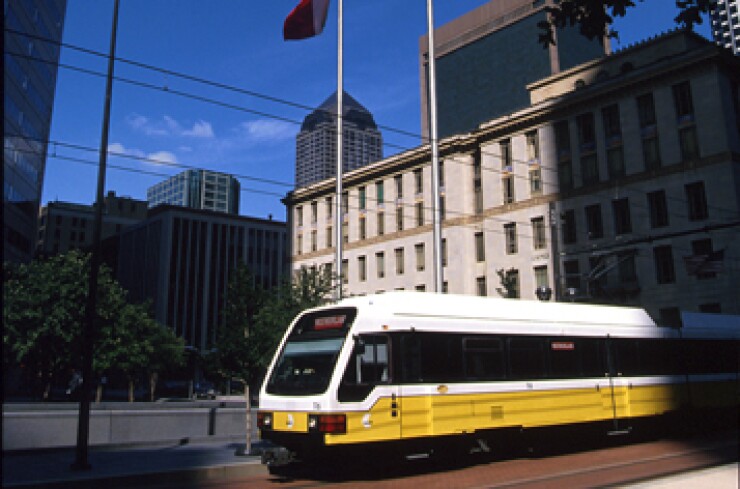
DALLAS — The Senate's first hearing on renewing the federal transportation infrastructure program came with a warning Thursday that its funding is drying up quickly.
Senate Banking Committee chairman Tim Johnson, D-S.D., said he called the session to review how public transit systems are faring under the two-year Moving Ahead for Progress in the 21st Century, or MAP-21, which funds transportation programs but expires on Sept. 30, the end of fiscal 2014.
But the overriding issue, Johnson said, is that the Highway Trust Fund, which provides the bulk of federal spending on transportation infrastructure, is running out.
"The mass transit account is expected to reach the end of MAP-21 on Sept. 30 with only a very small positive balance, and the highway account could face a shortfall by late summer," Johnson said. "Without congressional action, both accounts will be unable to support current program funding levels after MAP-21 expires."
Earlier this week Rep. Bill Shuster, R-Pa., chairman of the House Transportation and Infrastructure Committee, said he expects to have a new transportation funding law in place before the end of fiscal 2014.
Peter Rogoff, head of the Federal Transit Administration, told the Senate panel that the FTA and Federal Highway Administration are preparing procedures to deal with low balances in their respective HTF accounts.
"Estimates of the [mass transit account's] cash balance at the time MAP-21 was enacted were assumed to be sufficient through fiscal 2014," he said. "We have reason for concern as to whether this will be the case going forward."
If the balance in the mass transit account drops to $1 billion before the end of fiscal 2014, Rogoff said, local transit agencies might see a shortfall in their reimbursements or delayed payments.
"If someone is due a reimbursement of 100%, then they might get 80% or 90%," he said. "We may hold the bills from the larger agencies until we have the cash to pay them."
Treasury and Department of Transportation budget officials are updating program expenditures and revenue assumptions in preparation for the fiscal 2015 budget, Rogoff said.
"These estimates will be important in determining whether the cash balance is sufficient through the remainder of the current authorization and will provide useful information on the cash balance needed beyond 2014," Rogoff said.
MAP-21 authorized $10.6 billion for mass transit in fiscal 2013 and $10.7 billion in fiscal 2014, Rogoff said, but the allocated total was reduced through sequestration — automatic, across-the-board budget cuts put into place after Congress failed to reduce the federal budget deficit.
Congress has transferred more than $50 billion in general revenues to the HTF since 2008 due to a drop in fuel tax revenues, said Dave Wise, director of physical infrastructure issues at the Government Accountability Office.
"In May 2013, the Congressional Budget Office estimated that to maintain current spending levels plus inflation between 2015 and 2022, the Highway Trust Fund will require over $132 billion more than it is expected to take in over that period," Wise said. "About $35 billion of that deficit would be in the transit account."
The HTF receives revenue from the federal tax gasoline tax of 18.4 cents per gallon and the 24.4 cents per gallon tax on diesel fuel. Public transit is allocated 1 cent of the tax with the remainder earmarked for highway funding.
The MAP-21 funding law passed by the 2012 Congress provided $105 billion for surface transportation projects over two years but required a $19 billion transfer from the general fund to the federal Highway Trust Fund to keep it solvent, Wise said. "This approach may not be sustainable given competing demands for funding," he said.
The uncertainties keep the funding for surface transportation on GAO's High-Risk List, Wise said.
"A sustainable solution to funding surface transportation is based on balancing revenues to, and spending from, the Highway Trust Fund," Wise said. "Ultimately, major changes in transportation revenues or spending or both will be needed to bring the two into balance."





